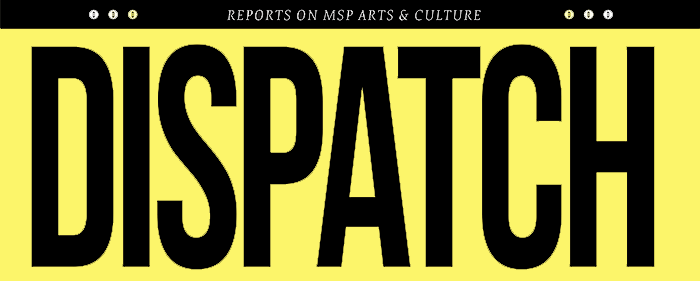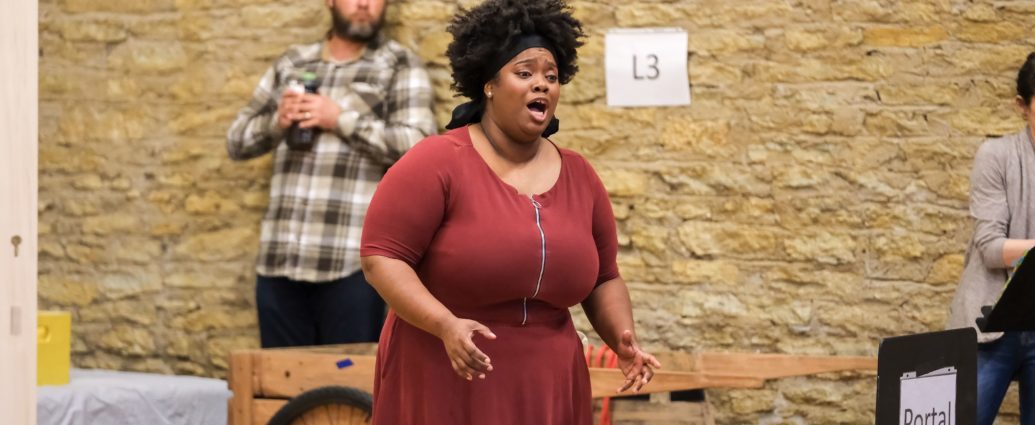The Minnesota Opera lets the women of Don Giovanni call the shots
The opera Don Giovanni has all the elements of entertainment—a dastardly bachelor, a wedding gone astray, swapped identities, and just desserts for the bad guy. Not to mention a sumptuous score by Wolfgang Amadeus Mozart.
But let’s linger on this dastardly bachelor for a moment: Don Giovanni is a type who pops up quite often in operas—a charming womanizer who believes he’s a gift to womankind and seeks to conquer as many of them as he can. A “walking pheromone,” as stage director Keturah Stickann likes to say.
Too often, stories about this archetype perpetuate the dynamics of an irresistible misogynist and his conquests, who are powerless against him. Sometimes they even celebrate it. And Don Giovanni is no exception—there’s an entire aria lauding the number of women he’s deflowered. Which begs the question, why bother re-producing this story? Does the art world really need to let another deplorable man strut around the stage?
The Minnesota Opera is exploring answers to that question. When the group first began discussing the possibility of producing Don Giovanni, general director Ryan Taylor observed that all other adaptations being performed around the country were all produced by men.
“One of the things that we were looking at is, ‘Is there value in these stories?’” he says. “And before we can determine whether there is or isn’t, we have to figure out if we’ve seen them interpreted for us in the same way over and over again.”
Don Giovanni is considered a staple of what opera aficionados call the inherited repertoire—widely known, beloved, classic operas. But their longevity doesn’t preclude these operas from re-interpretation. A women-led production of Don Giovanni is a first, and has vast implications for how themes and characters are portrayed.
“We’ve talked a long time about expanding the circle of storytelling, having people who haven’t had the agency to tell those stories—but it doesn’t necessarily mean throwing out old stuff,” Taylor says. “The point for us now is that we shouldn’t be telling these stories without examining whether we are promoting or educating or shedding light on something. I don’t think this is going to be a stereotypical production where…you’re left questioning whether or not it’s all in good fun or actually damaging behavior.”
Stickann has a history of reimagining classic operas with a humanizing and modern lens. This is her first collaboration with the MN Opera; Taylor said she was selected among director candidates because she possessed “the strongest narrative approach to the story that we felt would shed new light on how this story could be told.” As stage director, she oversees everything from developing the production’s concept to working with designers and artists to shape the story on stage.
“There are always a lot of Don Giovannis continually walking around the Earth,” she says. “The piece is about a misogynist, there’s no doubt about it.”
The opera follows Don Giovanni as he assaults the young woman Donna Anna, kills her father, and then attempts to evade capture. During this escape, he crosses paths with an old lover and a young bride who both test his skills. In the end, Don Giovanni is lured to a fiery death in hell.
Operating within this heavy framework, Stickann notes two approaches that drive her interpretation: First, Donna Anna is the catalyst for Giovanni’s demise—his final conquest, which only death follows. Second, Stickann sees and wants to celebrate the inherent strength of the women who Giovanni intersects with and who ultimately brings him down.
Stickann didn’t change the libretto—that is, the words that will be sung in the opera. Instead, she’s focusing on the three female leads and finding motives and moments that display their power and fortitude.
The first we meet, Donna Anna, is overpowered by Giovanni, but Stickann points out she spends the opera trying to seek him out and demand accountability—she’s no distressed damsel. Stickann tweaked the production to emphasize Donna Anna’s resilience and self-reliance.
“This thing happens to her and it’s a wakeup call that she might be able to live and survive and thrive without a man taking care of her,” Stickann says.
Newlywed Zerlina is the next woman whose portrayal gets a twist. Typically painted as a submissive, fickle wife, Stickann’s production proposes that Zerlina and husband Musetto are in a BDSM relationship—so when she flirts with Giovanni, the audience knows that they’re both in it together, playing games that meet their relationship’s needs.
Finally, Donna Elvira—once scorned by Giovanni and yet considering a return to his arms—also gets a backstory that provides context for her decision. It’s suggested that she is pregnant out of wedlock—and in the 1930s society the opera is set within, an agreement with even the rakish Giovanni would provide more protection than single motherhood.
“Maybe what she’s doing is not crying over this man because she still loves him but more that she’s terrified of giving birth to a bastard child,” Stickann says. “We give her a specific reason, a more urgent reason, to try to give him more chances than he deserves.”
These changes, Stickann says she envisions, will culminate in a production that subverts the typical narrative—dismantling the inevitability of male power and raising women up instead.
“It’s really important that it’s the female energy that brings him down,” Stickann says. “It’s the women who come at him and refuse to let him live his life the way he’s been living it.”
WHEN YOU GO
May 6-21, various times
Ordway Theater, 345 Washington St., St. Paul
Tickets $35-$37

